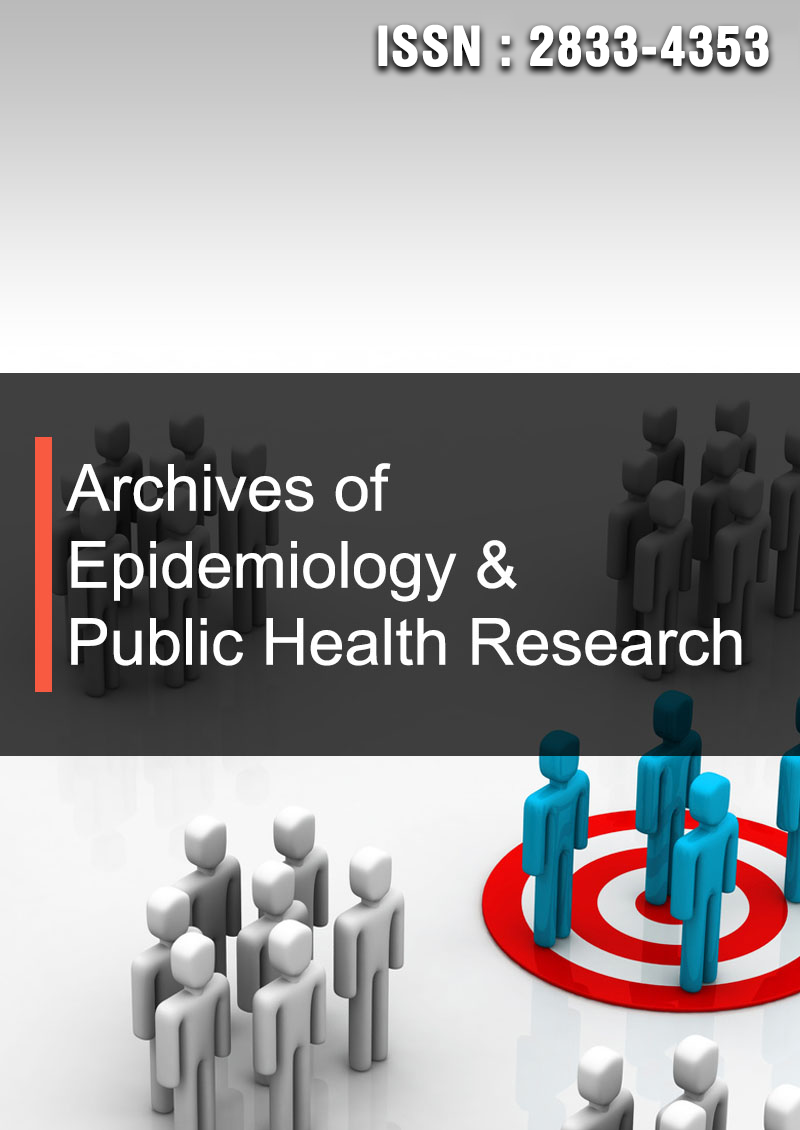Perspective Article - (2025) Volume 4, Issue 2
Reclaiming Healing Through Nutrition: Resistance to Plant-Based Diets and the Biblical Call to Restoration
2Indonesian College of Lifestyle Medicine, Indonesia
3Department of Cardiology, Faculty of Medicine, Prima University, Medan, Indonesia
Received Date: Mar 28, 2025 / Accepted Date: Apr 30, 2025 / Published Date: May 05, 2025
Copyright: ©2025 Dasaad Mulijono. This is an open-access article distributed under the terms of the Creative Commons Attribution License, which permits unrestricted use, distribution, and reproduction in any medium, provided the original author and source are credited.
Citation: Mulijono, d. (2025). Reclaiming Healing Through Nutrition: Resistance to Plant-Based Diets and the Biblical Call to Restoration. Arch Epidemiol Pub Health Res, 4(2), 01-03.
Abstract
Despite growing scientific evidence supporting using plant-based diets (PBDs) in preventing and reversing chronic diseases, these therapies remain underutilized in clinical practice. This article explores the multifactorial resistance to PBDs—medical, ethical, and spiritual—while drawing on scriptural insights that affirm lifestyle-based healing. Based on seven years of implementation at Bethsaida Hospital in Indonesia under the leadership of Prof. Dasaad Mulijono, we present clinical outcomes including re- gression of coronary artery disease (CAD), a restenosis rate as low as 2%, remission of hypertension, diabetes control without insulin, LDL cholesterol levels below 30 mg/dL, and reversal of obesity. These findings highlight the powerful synergy between evidence-based nutritional medicine and the biblical vision of health and restoration.
Keywords
Plant-Based Diet, Lifestyle Medicine, Prof. Dasaad Mulijono, Cardiovascular Disease, Faith-Based Healing, Chronic Disease Reversal, Medical Resistance, Biblical Health, Bethsaida Hospital.
Introduction
Chronic diseases such as coronary artery disease (CAD), hypertension, type 2 diabetes (T2D), dyslipidaemia, and obesity are the leading global causes of mortality [1-5]. An expanding body of research supports PBD as an effective and safe intervention for these conditions [6-10]. However, lifestyle-based therapies remain on the periphery of mainstream cardiology.
The reasons for resistance are complex, ranging from clinical inertia and commercial pressures to entrenched cultural habits [11- 15]. This paper considers an additional dimension: the spiritual. Drawing upon biblical texts and real-world outcomes from our cardiac program, we argue that neglecting healing dietary practices may reflect not only medical conservatism but also a more profound disconnection from God’s original design for human health.
Biblical Foundations of a Plant-Based Healing Paradigm
God’s Original Prescription
“I give you every seed-bearing plant... They will be yours for food.” — Genesis 1:29 [16]. This verse frames the PBD as God’s first gift for sustaining life—a concept now corroborated by modern nutritional epidemiology.
Daniel’s Nutritional Experiment
“Give us nothing but vegetables to eat and water to drink... they looked healthier...” — Daniel 1:12–16 [17]. Daniel’s experience is arguably one of the earliest comparative studies of dietary patterns, where plant-based intake resulted in measurable vitality.
Warnings About Rejected Truth
“For the time will come when people will not put up with sound doctrine...” — 2 Timothy 4:3 [18].
“They perish because they refused to love the truth...” — 2 Thessalonians 2:10 [19].
These verses echo the reality that therapeutic truth, including in medicine, is not always welcomed, especially when it challenges prevailing systems.
A Vision of Restored Creation
“The lion will eat straw like the ox...” — Isaiah 11:6-9 [20]. The prophetic imagery of a peaceful, plant-centred future reinforces the redemptive arc of returning to Edenic health principles.

Health as Divine Intent
“The Lord will keep you free from every disease...” — Deuteronomy 7:15 [21].
“I will take away sickness from among you...” — Exodus 23:25 [22]. Sickness, in this view, is often a byproduct of departing from God’s principles, especially dietary. The modern Western diet represents such a departure.
Clinical Outcomes from Bethsaida Hospital
For the past seven years, the cardiology team at Bethsaida Hospital has implemented PBDs as standard care. The outcomes have been both medically and ethically significant. Selected results include [23-29]:
Discussion
Our findings support the growing consensus that nutrition should be a primary modality in chronic disease management. However, real-world implementation remains hampered by scepticism— even in clinical circles. We believe this resistance is not merely scientific but cultural, ethical, and spiritual. Scripture presents a coherent vision in which nutrition is central to health, healing, and human flourishing. The current marginalization of lifestyle medicine echoes prophetic warnings about dismissing truth. Reclaiming dietary healing is not only medically sound but spiritually aligned with the redemptive mission of healthcare.
Conclusion
PBDs offer a clinically validated, cost-effective, and spiritually grounded approach to chronic disease. Our experience at Bethsaida Hospital affirms that profound healing can occur when medicine aligns with divine design. It is time for the global medical community to re-examine the role of diet, not as a supplement to pharmacology, but as a foundational therapy rooted in science and Scripture.
References
1. Hacker, K. (2024). The burden of chronic disease. Mayo Clinic Proceedings: Innovations, Quality & Outcomes, 8(1), 112-119.
2. Koehlmoos, T. P., Anwar, S., & Cravioto, A. (2011). Global health: chronic diseases and other emergent issues in global health. Infectious Disease Clinics, 25(3), 623-638.
3. Yach, D., Hawkes, C., Gould, C. L., & Hofman, K. J. (2004). The global burden of chronic diseases: overcoming impediments to prevention and control. Jama, 291(21), 2616- 2622.
4. Terzic, A., & Waldman, S. (2011). Chronic diseases: the emerging pandemic. Clinical and translational science, 4(3),225.
5. Kelly, B. B., Narula, J., & Fuster, V. (2012). Recognizing global burden of cardiovascular disease and related chronic diseases. Mount Sinai Journal of Medicine: A Journal of Translational and Personalized Medicine, 79(6), 632-640.
6. Bansal, S., Connolly, M., & Harder, T. (2022). Impact of a whole-foods, plant-based nutrition intervention on patients living with chronic disease in an underserved community. American Journal of Lifestyle Medicine, 16(3), 382-389.
7. Katz, D. L. (2019). Plant-based diets for reversing disease and saving the planet: past, present, and future. Advances in Nutrition, 10, S304-S307.
8. Yuan, L., Jiang, Q., Zhai, Y., Zhao, Z., Liu, Y., Hu, F., ... & Sun, J. (2024). Association between plant-based diet and risk of chronic diseases and all-cause mortality in centenarians in China: A cohort study. Current Developments in Nutrition, 8(1), 102065.
9. Key, T. J., Papier, K., & Tong, T. Y. (2022). Plant-based diets and long-term health: findings from the EPIC-Oxford study. Proceedings of the Nutrition Society, 81(2), 190-198.
10. Thompson, A. S., Tresserra-Rimbau, A., Karavasiloglou, N., Jennings, A., Cantwell, M., Hill, C., ... & Kühn, T. (2023). Association of healthful plant-based diet adherence with risk of mortality and major chronic diseases among adults in the UK. JAMA Network Open, 6(3), e234714-e234714.
11. Tuso, P. J., Ismail, M. H., Ha, B. P., & Bartolotto, C. (2013). Nutritional update for physicians: plant-based diets. The Permanente Journal, 17(2), 61.
12. 12. Storz, M. A. (2018). Is there a lack of support for whole- food, plant-based diets in the medical community?. The permanente journal, 23, 18-068.
13. Alcorta, A., Porta, A., Tárrega, A., Alvarez, M. D., & Vaquero,
M. P. (2021). Foods for plant-based diets: Challenges and innovations. Foods, 10(2), 293.
14. Lippman, D., Stump, M., Veazey, E., Guimarães, S. T., Rosenfeld, R., Kelly, J. H., ... & Katz, D. L. (2024). Foundations of lifestyle medicine and its evolution. Mayo Clinic Proceedings: Innovations, Quality & Outcomes, 8(1), 97-111.
15. Mulijono, D. (2024). Plant-Based Diets (PBDs): Challenges and Solutions. On J Cardio Res & Rep. 7(5): OJCRR. MS.ID.000672.
16. Holy Bible, Genesis 1:29.
17. Holy Bible, Daniel 1;12-16.
18. Holy Bible, 2 Timothy 4:3.
19. Holy Bible, 2 Thessalonians 2:10.
20. Holy Bible, Isaiah 11:6-9.
21. Holy Bible, Deuteronomy 7:15.
22. Holy Bible, Exodus 23:25.
23. Mulijono, D., & Albert, M. (2024). Hutapea, I Nyoman E Lister, Mondastri K Sudaryo, Helwiah Umniyati. Mechanisms Plant-Based Diets Reverse Atherosclerosis. Cardiology and Cardiovascular Medicine, 8, 290-302.
24. Mulijono, D. (2024). Plant-Based Diet in Regressing/ Stabilizing Vulnerable Plaques to Achieve Complete Revascularization. Archives of Clinical and Biomedical Research, 8(3), 236-244.
25. Mulijono, D., Hutapea, A. M., Lister, I. N. E., Sudaryo, M. K., & Umniyati, H. (2024). How a Plant-Based Diet (PBD) Reduces In-Stent Restenosis (ISR) and Stent Thrombosis (ST). Cardio Open, 9(1), 01-15.
26. Mulijono, D., & Albert, M. (2024). Hutapea, I Nyoman E Lister, Mondastri K Sudaryo, and Helwiah Umniyati. Plant- Based Diet to Reverse/Regress Vulnerable Plaque: A Case Report and Review. Archives of Clinical and Medical Case Reports, 8, 126-135.
27. Mulijono, D., Hutapea, A. M., Lister, I. N. E., Sudaryo, M. K., & Umniyati, H. (2024). Plant-Based Diets and Supplements in Mitigating COVID-19: Part 1. The Research Report. J Comm Med and Pub Health Rep 5 (08): https://doi. org/10.38207/ JCMPHR/2024/MAY05080572/A.
28. Mulijono, D., Hutapea, A. M., Lister, I. N. E., Sudaryo, M. K., & Umniyati, H. (2024). Plant-Based Diet and Supplements in Mitigating COVID-19: Part 2. The Mechanism behind Successful Intervention. J Comm Med and Pub Health Rep, 5(08).
29. Mulijono, D., Hutapea, A. M., Lister, I. N. E., Sudaryo, M. K., & Umniyati, H. (2024). Revolutionizing COVID-19 Treatment: Saving High-Risk Cardiac Patients from Severity, Hospitalization, and Death with Plant-Based Diets and Dietary Supplements. Archives of Clinical and Biomedical Research, 8(3), 245-252.



